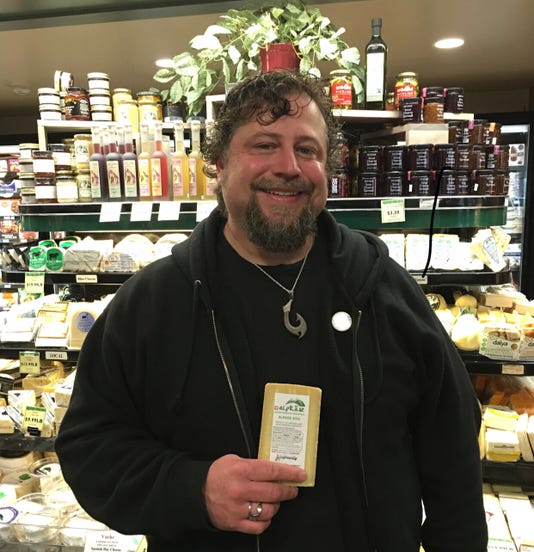 Swiss farmers Agnes and Paul Barmettler spent the summer tending to their cows on an Alpine pasture, turning the raw, full-fat milk from the herd into buttery cheese.
Swiss farmers Agnes and Paul Barmettler spent the summer tending to their cows on an Alpine pasture, turning the raw, full-fat milk from the herd into buttery cheese.
The unique flavor of their sharp Sbrinz and other organic cheeses comes from the fresh herbs and wildflowers on Alp Bleiki, the meadow where their cattle graze from May until the end of September.
This month, after the herds make their annual trek to spend the winter in lower pastures, their handcrafted cheese will be offered for sale. And it has nothing in common with the generic “Swiss cheese” sold in U.S. supermarkets.
Although Switzerland exports annually between 8,000 and 9,000 tons of cheese to the United States, they are primarily mass-produced varieties. The genuine Alpine cheese that uses only raw milk from cows grazing on natural grasses at high altitudes is harder to find. But thanks to a program called Adopt-an-Alp, which “matches” American retailers with Swiss dairy farmers, dozens of specialty shops in the U.S. now import this cheese directly from Alpine pastures.
One of them is Skagit Valley Food Co-op in Mount Vernon, Washington, which “adopted” Alp Bleiki in 2015. The store initially purchased 10 wheels (about 150 pounds) of the Barmettlers’ cheese, buying more in the following years.
“Being able to bring in amazing artisan cheese from small producers tucked away up in the Swiss Alps is a great opportunity,” said Galen LeGrand, the co-op’s cheese manager.
This cheese, which the co-op sells for $20 a pound, “is completely different from what we have in the U.S. The customers love it,” he added.
The Barmettlers are also happy to know their product is appreciated on the other side of the Atlantic. “We are honored that our cheese is loved in America,” Agnes said.
Adopt-an-Alp is the brainchild of Swiss expat Caroline Hostettler, who runs a cheese import business in Fort Myers, Florida. She founded the program in 2013 with a unique mission: “to offer U.S. consumers a chance to taste genuine Alpine cheeses and to give Swiss dairy farmers an opportunity to export their products that wouldn’t otherwise make it to America.”
The “matchmaking” is done online, where interested Americans can choose and negotiate directly with Swiss farmers. Currently. there are 80 retailers in the United States who have “adopted” one or more of 27 Alpine cheesemakers, based on what kind of cheese they’re interested in. Different herds graze on different pastures, nuancing the flavors in the milk, so each farmer’s cheese is unique.
But there’s also another aspect to Adopt-an-Alp: preserving an ancient tradition of transhumance, which means that the livestock spends winter months on low pastures and climbs back to highlands in the spring to graze in lush meadows so that their milk is flavorful.
Hostettler has traveled across the United States and Switzerland, personally meeting farmers and retailers to find people who “are passionate about the way Alpine cheese is made,” she said. “Only by understanding transhumance can we fully appreciate all the work these farmers do.”
Skagit’s LeGrand got a glimpse of the hard work needed to produce Alpine cheese he sells at his store when he visited the Barmettlers on Alp Bleiki in 2016.
“It was a life-changing experience,” he said.
“I gained a lot of respect not just for the cheesemakers but also for Switzerland as a whole,” he added.
Sonja Hoffmann, owner of RacletteCorner online shop based in Sioux Falls, South Dakota, joined the program earlier this year. She has ordered 20 wheels of her specialty, raclette — a semi-hard cheese used for melting — from Alp Maran, a dairy in a picturesque area of eastern Switzerland.
Now she is spreading the word of her new adoptee through her blog and newsletter.
“My customers are super excited to get great Alpine raclette cheese from Switzerland, while supporting the age-old tradition of transhumance,” she said.









